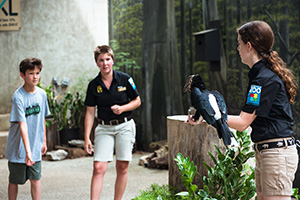Vanderbilt Kennedy Center TRIAD Program Partners With Zoological Association to Develop 'Inclusive Communities of Science'
October 11, 2021

|
The Vanderbilt Kennedy Center's (TN IDDRC, UCEDD, LEND) Treatment and Research Institute for Autism Spectrum Disorders (TRIAD) is collaborating with Oregon State University's STEM Research Center and the Association of Zoos and Aquariums (AZA) to support the Modeling Zoos and Aquariums as Inclusive Communities of Science (MoZAICS) project.
Funded by the National Science Foundation, MoZAICS focuses on developing an evidence-based framework of inclusive practices for zoos and aquariums to support science learning for individuals with autism. This work will impact the full zoo and aquarium experience, including the general visit, programs, exhibits, internships, volunteering and employment opportunities.
The four-year project will also support the building of a community of zoo and aquarium practitioners dedicated to the comprehensive inclusion of individualswith autism working toward an overall strategy of inclusion across the AZA community.
"Inclusion is when a host organization creates tools and incorporates modifications that allow all individuals to belong and make meaningful contributions to a space or program," said Lauren Weaver, M.S., TRIAD director of community engagement. "For individuals to feel a sense of belonging, the culture of the organization or group must allow each individual to feel valued and comfortable bringing their strengths, sharing their challenges and asking for help. Inclusion is not only being invited to the dance and being asked to dance but also creating an environment where everyone is comfortable dancing.
"The framework for this research will be informed through a study acrossthe zoo and aquarium field that includes a needs assessment and a review of the literature that currently develops inclusive practices for autistic individuals. The second phase of the study will focus on sharing the findings with practitioners across thezoo and aquarium field for feedback and reflection to develop an overall strategy for broader implementation and expansion of inclusion for autistic individuals.
Lastly, a process evaluation will explore how the approach taken in this project may be more broadly applied in understanding and advancing inclusion for other audiences historically underserved or by zoos and aquariums.
Weaver will work with Kelly Riedinger, Ph.D., senior researcher at Oregon State University, and Amy Rutherford, director of professional development and education at AZA, to spearhead the effort. Blaire Donnelly-Mason, program manager for TRIAD, and Victoria Bonebrake, an Oregon State University STEM Research Center fellow, will support the team.
VKC researchers will rely on their recent analysis, published inAutism(a Sage Publications academic journal), to inform their efforts for the MoZAICS project and to create meaningful opportunities for autistic individuals.
"The MoZAICS project represents one of the first of its kind to support autistic audiences within the zoo and aquarium context," said Weaver. "We are excited to look at the experience of autistic patrons at zoos and aquariums across the full breadth of engagement opportunities and to build strong, research-informed guidelines to drive true inclusion for neurodivergent individuals."
Photo 2: The MoZAICS logo, with navy blue block letters and a green, blue, and gray seahorse taking the place of the letter I.







